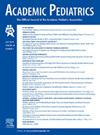Remediation in Pediatric Residency Training: A National Survey of Pediatric Program Directors
IF 3
3区 医学
Q1 PEDIATRICS
引用次数: 0
Abstract
Background
The goal of graduate medical education is for residents to achieve the skills and knowledge to practice medicine independently. While remediation is not uncommon in residency training, evidence is lacking to guide best practices.
Methods
We conducted a national survey of pediatric residency programs regarding their remediation experiences identifying struggling residents, documentating the process, and monitoring progress during remediation.
Results
A total of 50.8% (99/195) programs responded. Approximately 4.7% of residents underwent remediation, and 91% (262/288) of residents successfully completed remediation. Programs used data from the Clinical Competency Committee (CCC; 100%), rotation evaluations (98.9%) and direct observation (96.6%) to identify residents who need remediation. Most programs used an improvement plan to document resident progress (88.8%) and assigned a mentor or coach to support the resident (88.8%). Nearly all programs used rotation evaluations (93.3%) to monitor progress towards achieving the goals of remediation. Two-thirds (66.3%) felt their remediation process was either very effective or effective, and about half (56.2%) were very satisfied or satisfied with their remediation process. Programs with more residents who successfully completed remediation were more likely to feel satisfied with their program’s remediation processess and effectiveness.
Conclusions
Nearly 5% of pediatrics residents undergo remediation, with 91% successfully remediating. Two-thirds of program leaders feel their remediation practices are effective, and only half are satisfied with remediation processes in their program. Opportunities exist to improve remediation processes for pediatric residents and for programs to ensure graduation of competent pediatricians.
儿科住院医师培训中的补救:全国儿科项目主任调查。
背景:医学研究生教育的目标是使住院医师获得独立行医的技能和知识。虽然补救措施在住院医师培训中并不罕见,但缺乏指导最佳实践的证据。方法:我们对全国儿科住院医师项目进行了一项调查,了解他们的补救经验,确定挣扎的住院医师,记录过程,并监测补救过程。结果:共有50.8%(99/195)的项目有反应。约4.7%的居民接受了修复,91%(262/288)的居民成功完成了修复。项目使用的数据来自临床能力委员会(CCC;100%)、轮转评价(98.9%)和直接观察(96.6%)来确定需要修复的居民。大多数项目使用改进计划来记录住院医师的进步(88.8%),并分配导师或教练来支持住院医师(88.8%)。几乎所有的项目都采用了轮转评估(93.3%)来监测实现补救目标的进展情况。三分之二(66.3%)的人认为他们的修复过程非常有效或有效,约一半(56.2%)的人对他们的修复过程非常满意或满意。成功完成修复的居民越多,他们对项目的修复过程和效果就越满意。结论:近5%的儿科住院医师进行了修复,91%的住院医师修复成功。三分之二的项目领导者认为他们的补救措施是有效的,只有一半的人对他们项目中的补救过程感到满意。有机会改善儿科住院医师的补救程序,并确保有能力的儿科医生毕业。
本文章由计算机程序翻译,如有差异,请以英文原文为准。
求助全文
约1分钟内获得全文
求助全文
来源期刊

Academic Pediatrics
PEDIATRICS-
CiteScore
4.60
自引率
12.90%
发文量
300
审稿时长
60 days
期刊介绍:
Academic Pediatrics, the official journal of the Academic Pediatric Association, is a peer-reviewed publication whose purpose is to strengthen the research and educational base of academic general pediatrics. The journal provides leadership in pediatric education, research, patient care and advocacy. Content areas include pediatric education, emergency medicine, injury, abuse, behavioral pediatrics, holistic medicine, child health services and health policy,and the environment. The journal provides an active forum for the presentation of pediatric educational research in diverse settings, involving medical students, residents, fellows, and practicing professionals. The journal also emphasizes important research relating to the quality of child health care, health care policy, and the organization of child health services. It also includes systematic reviews of primary care interventions and important methodologic papers to aid research in child health and education.
 求助内容:
求助内容: 应助结果提醒方式:
应助结果提醒方式:


